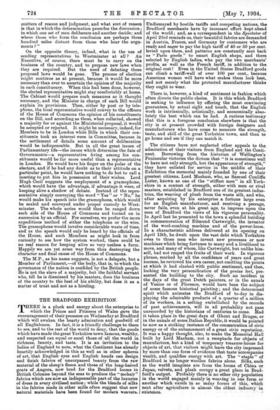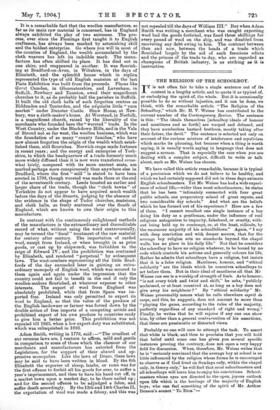Undismayed by hostile tariffs and competing nations, the Bradford merchants
have by incessant effort kept ahead of the world ; and, as a correspondent in the Spectator of April 23rd reminds us, their beautiful fabrics are demanded in Austria, France, and Germany by customers who are ready and eager to pay the high tariff of 40 or 50 per cent. levied upon them, and patterns are constantly sent back as " Paris goods " to smart English shops, and there selected by English ladies, who pay the two merchants' profits, as well as the French tariff, in addition to the original cost ! Even in the United States Bradford goods can climb a tariff-wall of over 100 per cent., because American women will have what makes them look best, and not merely what the protected manufacturer thinks they ought to wear.
There is, however, a kind of sentiment in fashion which often directs the public choice. It is this which Bradford is seeking to influence by offering the most convincing guarantees, by actual sight and touch, that the English work is intrinsically, artistically, and economically abso- lutely the best which can be had. A curious testimony that this is a foregone conclusion elsewhere is that the city is at present crowded with foreign designers and manufacturers who have come to measure the strength, taste, and skill of the great Yorkshire town, and then to go home and see if they can match it.
The citizens have not neglected other appeals to the admiration of their visitors from England and the Conti- nent. Borrowing from the historian of Wellington's Peninsular victories the dictum that " it is sometimes well to have not only strength, but the appearance of strength," they have enlisted for service in the middle of their Exhibition the memorial mainly founded by one of their greatest citizens, Lord Masham, who, as Samuel Cunliffe Lister, known as one of the " stiffest men" in all York- shire in a contest of strength, either with men or rival masters, established in Bradford one of its greatest indus- tries, the weaving of plush from the waste silk, and who, after acquiring by his enterprise a fortune large even for an English manufacturer, and receiving a peerage, never fails, even at his great age, to impress upon the men of Bradford the views of his vigorous personality. In April last he presented to the town a splendid building in commemoration of Edmund Cartwright, the inventor of the wool-combing machine and of the power-loom. In a characteristic address delivered at its opening on April 13th, he dwelt upon the vast debt which Yorkshire owes to those men who invent new processes or new machines which bring fortunes to many and a livelihood to more, and many of whom, like Cartwright, but unlike him- self, had not reaped the fruits of their work. In vigorous phrase, marked by all the confidence of years and great success, he reviewed his own career, not omitting the points at which it had clashed with public sentiment, and then, looking the very personification of the genius loci, pre- sented the building to the city. Such an incident in the days of the great Dutch painters, or in the annals of Venice or of Florence, would have been the subject of some famous historical painting ; and the determined spirit which animates the Bradford of to-day in dis- playing the admirable products of a quarter of a million of its workers, in a setting embellished by the records of past achievements, will in all probability not pass unrecorded by the historians of centuries to come. Had it taken place in the great days of Ghent and Bruges, or in the annals of some Italian Republic, it would be pointed to now as a striking instance of the concentration of civic energy or of the enhancement of a great civic reputation. It was a happy thought, also, to make the Memorial Hall built by Lord Masham, not a receptacle for objects of manufacture, but a kind of temporary treasure-house for objects of art, that visitors might leave the city impressed by more than one form of evidence that taste 'accompanies wealth, and qualifies energy with art. The " staple " of Bradford is no longer woollen fabrics alone. Silks, such as the world imagines are from the looms of China or Japan, velvets, and plush occupy a great place in Brad- ford's output. Probably there is no other city population in the world engaged mainly in weaving in one form or another which excels in so many forms of this, which next after agriculture is almost the oldest industry in existence. It is a remarkable fact that the woollen manufacture, so far'as its main raw material is concerned, has in England alWays exhibited the play of two extremes. The pro- cess, ever since the Flemings first taught it to English craftsmen, has always been marked by astonishing skill and the boldest enterprise. Go where you will in most of the counties of England, the wealth accumulated by the cloth -weavers has left its indelible mark. The manu- facture has often shifted its place. It has died out in one shire, and reappeared in another. It was flourish- ing at Bradford-on-Avon, in Wiltshire, in the days of Elizabeth, and- the splendid house which in replica represented the type of old English mansion at the last Paris Exhibition was built from the proceeds. Places like Groat Camden, in. Gloucestershire, and Lavenham, in Suffolk, Newbury and Taunton, owed their magnificent churches to it, as do probably half the parishes in Suffolk. It bUilt the old cloth halls of such forgotten centres as Biddenden and Tenterden, and the exquisite little " yarn market" under Dunster Castle. Shaw House, at New- bury, was a cloth-maker's home. At Worstead, in Norfolk, is a magnificent church, raised by the liberality of the merchants who founded here the " worsted " trade. In the Weit Country, under the Blackdown Hills, and in the Vale of Stroud not so far west, the woollen business, which was the foundation of so many " county families," who have now almost forgotten the origin of the wealth which estab- lished them, still flourishes. Norwich crape made fortunes in recent years ; and the energy and enterprise of York- shire, to which the headquarters of a trade formerly much more widely diffused than it is now were transferred some- what lately, compared with its more ancient seats, are marked_perhaps more conspicuously than anywhere else in Bradford, where the first " mill " is stated to have been erected in 1798, though worsted was made there at the end of the seventeenth century. Leeds boasted an earlier and larger share of the trade, though the " cloth towns " of Yorkshire do not appear to have acquired much wealth before the days of the Stuarts, judging by the absence of the evidence in the shape of Tudor churches, matisions, and cloth halls, so freely scattered over the South of England, which are known to owe their origin to this manufacture.
In contrast with the continuously enlightened methods of the manufacture is the extraordinary and discreditable record of what, without using the word controversially, may be termed the " fiscal " treatment of the raw material for century after century. The importation of carded wool, except from Ireland, or when brought in as prize goods, or cast up by shipwreck, was forbidden in the reign of Edward IV., and the prohibition was continued by Elizabeth, and rendered " perpetual " by subsequent laws. The wool-combers representing all the little Brad- fords of the day succeeded later in gaining an extra- ordinary monopoly of English wool, which was secured to them again and again under the impression that the country could not fail to benefit in the end if only the woollen-makers flourished, at whatever expense to other interests. The export of wool from England was absolutely prohibited, while that from Spain was im- ported free. Ireland was only permitted to export its wool to England, so that the value of the produce of the English landowner or farmer was forced down by the double action of free imports of a competing article and prohibited export of his own produce to countries ready to give him a better price. This prohibition was not repealed till 1825, when a low export-duty was substituted, which was relinquished in 1833.
Adam Smith, writing in 1776, said :—" The cruellest of our revenue laws are, I venture to affirm, mild and gentle in comparison to some of those which the clamour of our merchants and manufacturers has extorted from the Legislature, for the support of their absurd and op- pressive monopolies. Like the laws of Draco, these laws may be said to have been written in blood. By the 8th Elizabeth the exporter of sheep, lambs, or rams was for the first offence to forfeit all his goods for ever, to suffer a year's imprisonment, and then to have his hand cut off, in a market town upon a market day, to be there nailed up ; and for the second offence to be adjudged a felon, and suffer death accordingly. By the 13th and 14th Charles II. the exportation of wool was made a felony, and this was not repealed till the days of William M." But when Adam Smith was writing a merchant who was caught exporting wool had the goods forfeited, was fined three shillings for every pound of wool on the ship, and was disabled from recovering any debt owing to him. The contrast between then and now, between the heads of a trade which flourished largely by the aid of such ferocious edicts and the princes of the trade to-day, who are regarded as champions of British industry, is as striking as it is instructive.











































 Previous page
Previous page